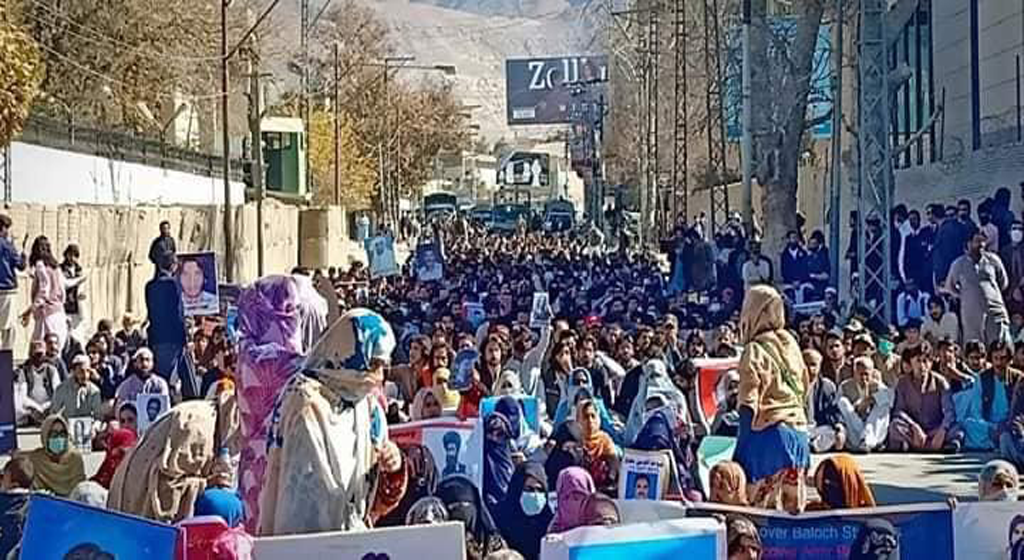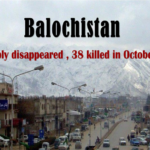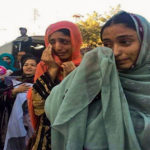Pakistani security forces abducted 35 persons from Khuzdar, Kech, Awaran, Gwadar and Lasbela districts of Balochistan.
On 13 November, Pakistani forces abducted Sayit Swali resident of Mand Kolwah.
On 12 November, forces and personnel of intelligence agencies abducted Abdul Wahid Ali Jan and Amir Bakhsh Naz Mohammad, residents of Zyarat Dan, district Awaran from Hub district Lasbela.
On 11 November, forces abducted Rashid Ibrahem, Akram Sayad, Akhtar Omed and his two brothers, Khalil and Liaqat from Bahot Chath, Dasht, district Kech.
On 10 November, forces abducted a balochi poet Akram Zakir Ata Mohammad from Zamuran, Buleda, district Kech.

On 10 November, forces abducted a student Shakil Mola Bakhsh resident of Kolwa, district Kech from Aapsar area of Turbat, district Kech.
On 09 November, forces raided a house in Pirandar, district Awaran and abducted Ghafoor Nizar, a farmer by profession.
On 05 November, personnel of intelligence agencies raided Noorullah Habibullah house in Kili Bawal Khan and abducted him.
On 28 October, personnel of intelligence agencies abducted Asif Ali, resident of Zaren Bogh, Dasht from GTA park, district Gwadar.
On 28 October, personnel of intelligence agencies abducted Hassan Kamalan from Kahnak, Mand district Kech.
On 20 October, forces and personnel of intelligence agencies raided a house in New Town, district Gwadar and abducted Musa Iqbal and his brother Mujib, residents of Dasht, district Kech. Separately, Qadir Hasil resident of Nayabad, Gwadar was abducted from Ward Captain Murad Bakhsh by the forces.
On 20 October, forces abducted Ghalib Lal Bakhsh and Shahdad from Malant, Tump, district Kech.
On 19 October, forces abducted 60 years old Gajian Ibrahim, Waris Mohammad and Sadiq Rustum from Dasht, district Kech.
On 19 October, forces raided a house in Khalidabad, Mashkay, district Awaran and abducted Abdul Rahim Azim Khan and Pasand Jamal Khan.
On 19 October, forces abducted Latif Faqir Bakhsh, Swali Ahmed, Waqar Arz Mohammad, Babul Mohammad and Washdil Bujer from Jamakk, Pidark, district Kech.
[ngg src=”galleries” ids=”1″ display=”basic_thumbnail”]
On 18 October, forces and personnel of intelligence agencies abducted Abdul Wahid Khuda Bakhsh resident of Baghbana, Khuzdar, from Khuzdar Bus terminal Centre.
On 18 October, forces raided a house in Zumdan, Pirandar, district Awaran and abducted Noor Bakhsh Mayar.
On 18 October, forces abducted Ali Bakhsh Rahim Bakhsh and Ishaq Hussain from Jamakk, Pidark, district Kech.
On 14 October, forces abducted Azhar Jalil, Halim and qader from district Kech.
[ngg src=”galleries” ids=”2″ display=”basic_slideshow”]
Whereabouts of the abductees remain unknown.
The Pakistan military adopted a policy of enforced disappearances and severe military operations to stifle the Baloch peoples struggle for their political and economic rights. Since 2004, thousands of Baloch activists, poets, students, rights activists and others have been forcibly disappeared. The military keeps their whereabouts unknown and subjects them to torture for months.
In 2009, the situation got worse. The Pakistan military abducted three key Baloch leaders, including Ghulam Mohammad Baloch who was the President of the Baloch National Movement (BNM), from the Turbat city of Balochistan on April 3, 2009. In a week, on April 9, their tortured and bullet-riddled bodies were found dumped near the Turbat city. It was the beginning of the military’s now infamous kill-and-dump operations, in which they abduct political activists, journalists, educationists, student activists and human rights defenders, and later dump their bodies in desolated areas.


